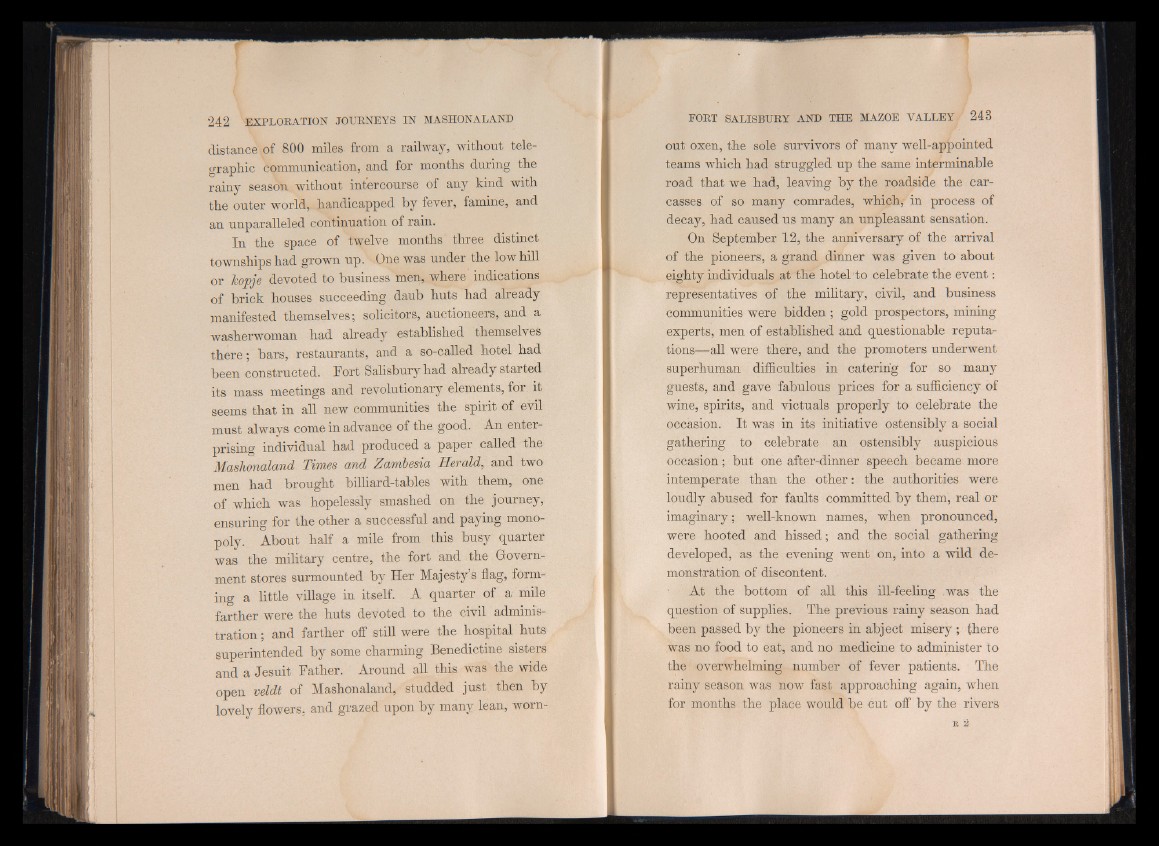
distance of 800 miles from a railway, without telegraphic
communication, and for months during the
rainy season without intercourse of any kind with
the outer world, handicapped by fever, famine, and
an unparalleled continuation of rain.
In the space of twelve months three distinct
townships had grown up. One was under the low hill
or Tcopje devoted to business men, where indications
of brick houses succeeding daub huts had already
manifested themselves; solicitors, auctioneers, and a
washerwoman had already established themselves
there; bars, restaurants, and a so-called hotel had
been constructed. Fort Salisbury had already started
its mass meetings and revolutionary elements, for it
seems that in all new communities the spirit of evil
must always come in advance of the good. An enterprising
individual had produced a paper called the
Mashonaland Times and Zambesia Herald, and two
men had brought billiard-tables with them, one
of which was hopelessly smashed on the journey,
ensuring for the other a successful and paying monopoly.
About half a mile from this busy quarter
was the military centre, the fort and the Government
stores surmounted by Her Majesty’s flag, forming
a little village in itself. A quarter of a mile
farther were the huts devoted to the civil administration
; and farther off still were the hospital huts
superintended by some charming Benedictine sisters
and a Jesuit Father. Around all this was the wide
open veldt of Mashonaland, studded just then by
lovely flowers, and grazed upon by many lean, wornout
oxen, the sole survivors of many well-appointed
teams which had struggled up the same interminable
road that we had, leaving by the roadside the carcasses
of so many comrades, which, in process of
decay, had caused us many an unpleasant sensation.
On September 12, the anniversary of the arrival
of the pioneers, a grand dinner was given to about
eighty individuals at the hotel to celebrate the event:
representatives of the military, civil, and business
communities were bidden ; gold prospectors, mining
experts, men of established and questionable reputations—
all were there, and the promoters underwent
superhuman difficulties in catering for so many
guests, and gave fabulous prices for a sufficiency of
wine, spirits, and victuals properly to celebrate the
occasion. It was in its initiative ostensibly a social
gathering to celebrate an ostensibly auspicious
occasion; but one after-dinner speech became more
intemperate than the other: the authorities were
loudly abused for faults committed by them, real or
imaginary; well-known names, when pronounced,
were hooted and hissed; and the, social gathering
developed, as the evening went on, into a wild demonstration
of discontent. .
At the bottom of all this ill-feeling was the
question of supplies. The previous rainy season had
been passed by the pioneers in abject misery ; fhere
was no food to eat, and no medicine to administer to
the overwhelming number of fever patients. The
rainy season was now fast approaching again, when
for months the place would be cut off by the rivers
E '2